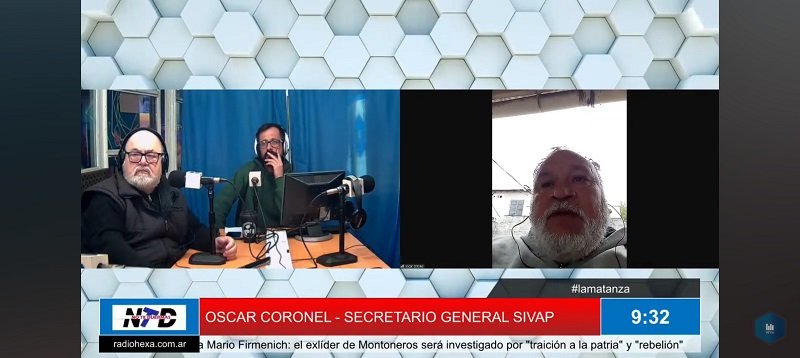You Heard It on “No Te Duermas”

On the radio program, Oscar Coronel, General Secretary of SIVAP (Union of Street Vendors), discussed the mistreatment experienced by workers at the hands of police forces.
Tomás Modini @ModiniTomas
“The Persecution is Brutal”
At the start of the conversation on “No Te Duermas,” Oscar Coronel described the situation: “We work all over the country. Generally speaking, the activity has increased significantly during this time, similar to what happened in 2001. The only difference is that today Buenos Aires City has the most advanced technology and uses it to control unlicensed sales.”
“This exacerbates the social crisis because, in 2001, everyone went out to sell and could do so to get through tough times. Today they can’t because the persecution is brutal. It’s unequal because generally, when repression occurs, it’s 1 to 10 police officers against one vendor, and there’s no point of negotiation because the City State has no dialogue with us or with the street vendors who feel defenseless,” he elaborated.
He also explained that “they can’t recover their merchandise because the state has a system, through the prosecution offices, where in many cases they don’t issue seizure receipts, and when they do, they handle it globally, taking 10 or 15 colleagues at once, holding the first person to arrive at the prosecution responsible, and that person faces a huge fine,” adding that “those who can’t pay find it difficult to recover their items.”
“But those who come later can’t retrieve their goods because they’re held responsible for someone else’s actions and could even face jail time if they have a criminal record. They view this as an incentive for what they consider illegal activity, but for us, it’s a necessity,” he noted.
“The Intolerance is Total”
On another note, the interviewee emphasized the harsh working conditions: “Sometimes, as happens in other areas like Once or Flores, police or City officials do prior intelligence, tracking colleagues to their homes where they conduct individual or collective raids. They not only seize items at the workplace but also at home. There have been cases where they’ve taken clothing from children or family members, and this cannot be recovered.”
Regarding what happens when a vendor reacts, he stated that “it’s seen as resistance to authority; they’re detained, spend a few days in police stations with numerous crimes and overcrowded conditions,” and that “there are people with prison experience who exert dominance, leading to situations typical of any prison section like Ezeiza or Marcos Paz.”
“It’s an experience I wouldn’t recommend to anyone, but today the need to bring food home forces people to expose themselves to such risks,” he lamented.
“The vulnerability of street vendors is absolute. There are cases where they’ve seized entire peanut candy stalls and the entire workplace, not just the vendors but the vendors’ stalls. In many cases, there’s a delay from the state in issuing a permit; we try to ensure that colleagues can obtain the necessary permits to work in the City, completing all the required procedures. We follow a systematic plan for each colleague, and in many cases, we wait 4 or 5 years for authorization to work on the street. It’s madness, a long time, and the intolerance is total,” he concluded in a harsh analysis.
Te pueden interesar:
https://www.instagram.com/diarioncomatanza
https://facebook.com/diarionco



